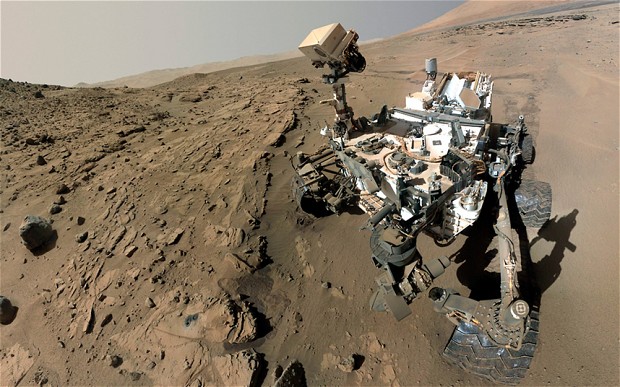The science community is buzzing as NASA prepares to reveal a groundbreaking “Mars mystery solved” that stargazers are predicting will move humans closer to stepping foot on the Red Planet and finding alien life in our solar system.
Though America’s space agency is keeping the details of their “major science finding” under wraps for now, space experts think the list of conference participants indicates NASA will herald the “game-changing” discovery of liquid water under the surface of Mars.
“If they’re announcing that they’ve found easily accessible, freely flowing liquid water under the surface — which is one of the theories we’ve been hearing for years and years — that has massive implications both for the potential for life on that planet and sustainability of humans,” said Doug McCuistion, former head of NASA’s Mars program. “That would be highly enabling and might be the game-changing trigger for both finding life and hurrying up and getting people to Mars.”
Among the scientists slated to speak at the 11:30 a.m. news briefing tomorrow in Washington, D.C., will be Alfred McEwen of the University of Arizona in Tucson and Lujendra Ojha of the Georgia Institute of Technology in Atlanta — both of whom McCuistion identified as pioneers in the study of liquid water on Mars.
Chris Carberry, executive director of the Beverly-based Explore Mars, is among the scientists speculating that their inclusion means the announcement will be somehow related to the existence of liquid water.
“Based on the people who are speaking and what their backgrounds are ... it would seem to imply they have a discovery concerning these mysterious outflows that come from the cliffsides on Mars, which people have speculated for years could be liquid water and seemed to go against people’s perceptions about what is possible on Mars,” Carberry said. “If they do confirm this is water that’s seasonally flowing ... that would be an amazing discovery with dramatic implications.”
The discovery of water on Mars is nothing new — scientists have known for years that the planet has two distinct polar ice caps and belts of glaciers — but verifying that the Red Planet is home to water in its liquid state would be revolutionary.
In addition to providing future astronauts with a readily available source of water and oxygen, Carberry said the existence of liquid water on Mars could lead to alien life.
“It implies that there is some sort of heat source keeping the water liquefied and here on Earth, whenever you have heat and water, 100 percent of the time you have life,” Carberry said. “We have no idea if that holds true on Mars, we don’t know if there is life on Mars or if there ever has been — but it would certainly be another piece of evidence.”
McCuistion was quick to point out that finding and accessing sub-surface rivers, lakes or oceans on Mars would move NASA scientists light years closer to putting people on the Red Planet.
“One of the big challenges for scientists is the production of enough oxygen and enough water to sustain a human crew,” McCuistion said. “If it’s already there and you don’t have to bring it, that could save you many, many metric tons of resupply as well as initial carrying capacity and landing mass ... if you take water out of the equation that’s going to lighten the load significantly.”{by boston hearld}
Though America’s space agency is keeping the details of their “major science finding” under wraps for now, space experts think the list of conference participants indicates NASA will herald the “game-changing” discovery of liquid water under the surface of Mars.
“If they’re announcing that they’ve found easily accessible, freely flowing liquid water under the surface — which is one of the theories we’ve been hearing for years and years — that has massive implications both for the potential for life on that planet and sustainability of humans,” said Doug McCuistion, former head of NASA’s Mars program. “That would be highly enabling and might be the game-changing trigger for both finding life and hurrying up and getting people to Mars.”
Among the scientists slated to speak at the 11:30 a.m. news briefing tomorrow in Washington, D.C., will be Alfred McEwen of the University of Arizona in Tucson and Lujendra Ojha of the Georgia Institute of Technology in Atlanta — both of whom McCuistion identified as pioneers in the study of liquid water on Mars.
Chris Carberry, executive director of the Beverly-based Explore Mars, is among the scientists speculating that their inclusion means the announcement will be somehow related to the existence of liquid water.
“Based on the people who are speaking and what their backgrounds are ... it would seem to imply they have a discovery concerning these mysterious outflows that come from the cliffsides on Mars, which people have speculated for years could be liquid water and seemed to go against people’s perceptions about what is possible on Mars,” Carberry said. “If they do confirm this is water that’s seasonally flowing ... that would be an amazing discovery with dramatic implications.”
The discovery of water on Mars is nothing new — scientists have known for years that the planet has two distinct polar ice caps and belts of glaciers — but verifying that the Red Planet is home to water in its liquid state would be revolutionary.
In addition to providing future astronauts with a readily available source of water and oxygen, Carberry said the existence of liquid water on Mars could lead to alien life.
“It implies that there is some sort of heat source keeping the water liquefied and here on Earth, whenever you have heat and water, 100 percent of the time you have life,” Carberry said. “We have no idea if that holds true on Mars, we don’t know if there is life on Mars or if there ever has been — but it would certainly be another piece of evidence.”
McCuistion was quick to point out that finding and accessing sub-surface rivers, lakes or oceans on Mars would move NASA scientists light years closer to putting people on the Red Planet.
“One of the big challenges for scientists is the production of enough oxygen and enough water to sustain a human crew,” McCuistion said. “If it’s already there and you don’t have to bring it, that could save you many, many metric tons of resupply as well as initial carrying capacity and landing mass ... if you take water out of the equation that’s going to lighten the load significantly.”{by boston hearld}










